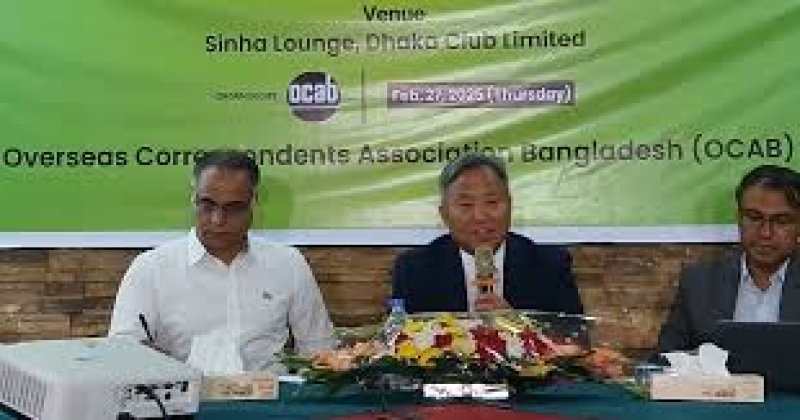- Stay alert against election conspiracies: Tarique Rahman |
- BNP's extended meeting held in Capital Dhaka |
- Khaleda urges ‘ironclad unity’ to defend mass uprising gains |
- GCF Board Approves Funding of $868.8m for Projects |
- UNRWA Report 161 on the Crisis in Gaza Strip and West Bank |
S. Korea to Back Bangladesh’s Economic Growth: Envoy

South Korean Ambassador to Bangladesh Park Young-sik expressed his country's commitment to supporting Bangladesh's efforts towards achieving sustainable and quality economic growth. Speaking at a meeting with members of the Overseas Correspondents Association of Bangladesh (OCAB) on Thursday, the ambassador emphasized the importance of focusing not just on the quantity but also the quality of economic growth.
“Bangladesh must prioritize not only the volume of its growth but the caliber of it,” Ambassador Park stated. He highlighted that quality economic growth should be driven by innovation, knowledge, and technology—areas where foreign companies, particularly from South Korea, could play a significant role.
The ambassador pointed out the need for Bangladesh to enhance its manufacturing sector to drive rapid economic progress. He proposed reducing high tariffs on raw and intermediate materials to stimulate domestic manufacturing, which he noted has been overshadowed by the country's growing focus on trade. “Currently, many Bangladesh companies are more engaged in trading than in manufacturing,” he explained.
Ambassador Park also discussed the potential of expanding Bangladesh’s trade sectors, particularly in textiles, jute, footwear, pharmaceuticals, and light industrial goods. He suggested that new items could be added to the trade portfolio, particularly with the ongoing negotiations for a Free Trade Agreement (FTA) between Bangladesh, South Korea, and other countries. The ambassador further indicated that this FTA could open new trade channels, particularly diversifying from other countries.
A key focus of the ambassador’s remarks was the need to attract more foreign direct investment (FDI) to Bangladesh, which, according to him, currently stands at the lowest GDP ratio—only 0.75%. In comparison, India has a ratio of 1.7%, and Vietnam’s stands at 4.7%. He emphasized that merely offering incentives would not be enough. "Improvements are needed in areas such as simplifying visa procedures, customs clearance, rationalizing tax policies, and ensuring the repatriation of profits with no withholding tax," he added. The ambassador also stressed that tangible improvements in governance, particularly in tackling corruption, are essential to create a more conducive environment for FDI.
Ambassador Park noted that attracting foreign investment also requires ensuring a high quality of life for expatriates in Bangladesh. He emphasized the importance of offering comfortable living conditions to foreign investors and their families.
When questioned about Bangladesh's FDI climate, the ambassador suggested that domestic companies are best positioned to assess the local business environment. He stressed the importance of attracting investment from countries such as China and those in the Middle East, which have significant capital but are less integrated into the global financial system compared to Western countries, Japan, and South Korea.
On infrastructure development, Ambassador Park highlighted that Bangladesh has vast potential in this area, with South Korea aiming to become a major partner in its infrastructure projects, just as it has been in the country’s ready-made garment (RMG) sector.
The event, presided over by OCAB President Nazrul Islam Mithu, saw General Secretary Julhas Alam deliver the welcome speech.

